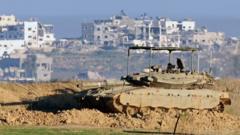Negotiations between Israel and Hamas are reportedly nearing an agreement for a ceasefire in Gaza, striking a balance between hostages and prisoner exchanges. The ongoing conflict, which escalated following Hamas's attack on Israel in October 2023, has resulted in extensive displacement among Gaza's 2.3 million residents.
The anticipated ceasefire, if finalized, would be a historic shift after 15 months of war, involving the release of Israeli hostages currently held by Hamas and a corresponding number of Palestinian prisoners. Reports indicate that 251 individuals were taken hostage during the initial Hamas assault, with current estimates suggesting 94 remain captive. Israel is prepared to exchange nearly 1,000 Palestinian prisoners for these hostages, some serving lengthy sentences, while maintaining a firm stance against releasing those convicted of severe offenses into the occupied West Bank.
The ceasefire is planned to unfold in three phases, starting with the release of 34 civilian hostages, followed by the repatriation of the remaining soldiers and reservists. In the process, Israeli troops are expected to withdraw from densely populated areas in Gaza. However, skepticism lingers regarding the overall durability of the ceasefire due to the enduring mistrust between the two parties.
Concerns persist that while a ceasefire might pause hostilities, it may not signify an end to the conflict. Israel aims to weaken Hamas's military stature significantly, a task complicated by the group's continuing operational capabilities. Additionally, the timeline for withdrawal of Israeli forces remains ambiguous, alongside debates about which prisoner releases will be considered.
The humanitarian crisis exacerbated by the war highlights the need for immediate assistance, with more than 46,600 fatalities reported in Gaza amidst ongoing Israeli strikes. This situation underscores the stakes involved, not only for political negotiations but also for the millions affected by the humanitarian fallout of this prolonged conflict.
As discussions continue, the fragile nature of any potential ceasefire raises the specter of renewed violence at any moment, especially given the complexities of the proposed deal and the deeply rooted historical tensions in the region.

















